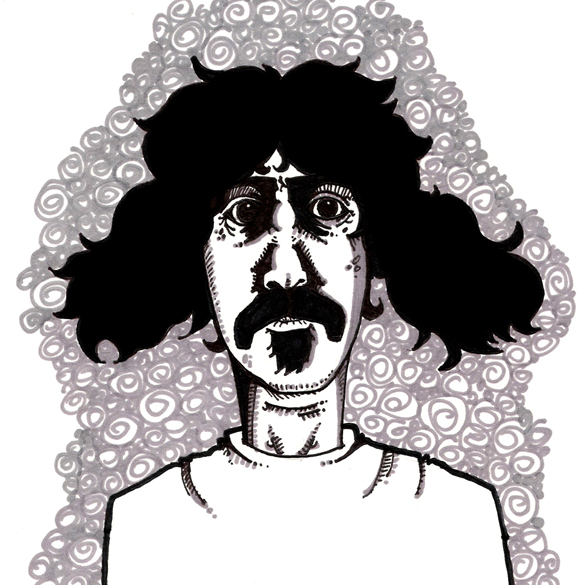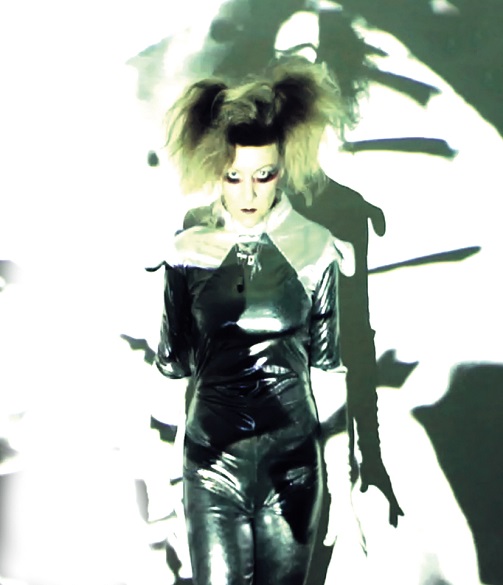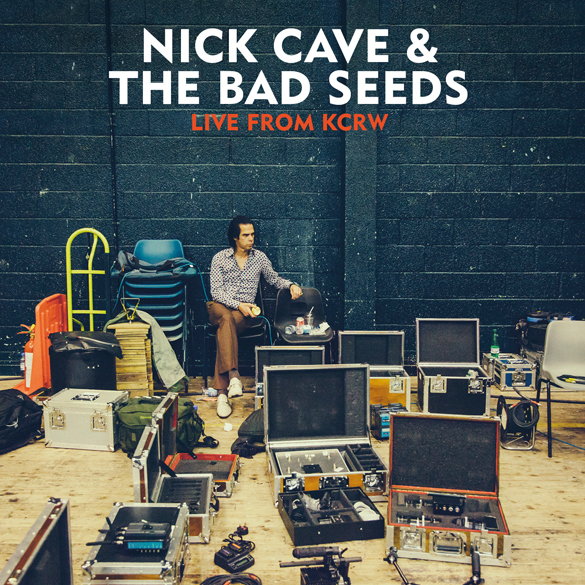“I’m gonna tell you the way it is/And I’m not gonna be kind or easy”
Frank Zappa, “Harry, You’re a Beast”
The contributions that Frank Zappa made to music are a matter of historical record. As The Rolling Stone Album Guide notes, “Frank Zappa dabbled in virtually all kinds of music-and, whether guised as a satirical rocker, jazz-rock fusionist, guitar virtuoso, electronics wizard, or orchestral innovator, his eccentric genius was undeniable.” But Zappa’s oeuvre is equally notable for its brilliantly observant social commentary. The lyric snippet from “Harry You’re a Beast” could stand as Zappa’s statement of purpose musically. He told it the way it was, and it was never kind or easy. The album containing the above lyrics, 1968‘s We’re Only In It For the Money, contains some of Zappa’s most piercing satire, and it spares no one in its mockery, particularly the counterculture. Zappa’s intent was apparent even before the album was played. The gatefold featured a parody of the Sgt. Pepper’s Lonely Hearts Club Band cover, complete with cut out photos of various celebrities, a real live Jimi Hendrix, the Mothers themselves in drag, and fruits and vegetables in place of the ubiquitous flowers (the gatefold photo had been intended to be the cover, but Zappa’s record company protested). The back cover featured the Mothers, all with their backs to the camera save one. Zappa’s message was clear; he wasn’t afraid to tip over the hip crowds’ sacred cows, and nothing was outside the boundaries for his razor wit. He was also clearly mocking the tendency of many of the era’s artists to take themselves way too seriously. Psychedelic music wasn’t about about art; it was about commerce. It could also be very silly and pretentious.
Zappa’s withering criticism of the Hippie movement and his refusal to go along with its narrow minded worldview or destructive habits made him something of an oddity. He didn’t do drugs, but made music that was mind-expanding, and though he was a caustic critic of the establishment, he was just as hard on those in the underground for being equally as bigoted and unyielding. He was, as Jack Kerouac called himself, “a Bippie in the middle.” By the 80’s he was known for his crusade against censorship and his criticism of the religious right, who advocated government prohibition of entertainment they deemed “offensive.” But it should be noted that Zappa’s nemesis in his battle against the Parents Music Resource Center was Tipper Gore, hardly a scion of the religious right. For many liberals, Zappa’s lyrics were offensive for their politically incorrect aspects; in this case, the left showed as much aptitude for censorship as the religious right (think speech codes and “hate free zones,” which Zappa would’ve detested). Thus, Zappa refused to be pigeonholed ideologically and often went against the grain of modern liberal thinking. Nowhere is Zappa’s refusal to go along with the leftist herd more evident than on “We’re Only In It For the Money,” though he lampoons the conservative establishment as well.
Zappa takes careful aim at the counterculture right from the first song (the first track is, technically, not a song, but a “music concrete” featuring dialogue by, among others, Eric Clapton), “Who Needs the Peace Corps?”
Walked past the wig store
Danced at the Fillmore
I’m completely stoned
I’m hippy & I’m trippy
I’m a gypsy on my own
I’ll stay a week & get the crabs &
Take a bus back home
I’m really just a phony
But forgive me
‘Cause I’m stoned
The lifestyle promoted by the counterculture is just as shallow as that against which they are reacting; they are as phony as the “straights” they demean. The desire to “drop out” is just an excuse for people who have no direction in life and eschew responsibility for their existence (“Forgive me/Cause I’m stoned”). Furthermore, the alternative lifestyle the hippies are promoting has been commodified: “Psychedelic dungeons/Popping up on every street…First I’ll buy some beads/And then perhaps a leather band…I will ask the Chamber of Commerce/How to Get to Haight Street.”
But Zappa is critical of the parents of the drop-outs as well, mainly for creating the conditions by which such meaningless rebellion against straight society is possible. The reaction of the older generation to their children’s wayward behavior is extreme, and simply serves to feed into the whole “Us vs. Them” mentality of the youth. He paints a stark picture of the generation gap in “Mom & Dad.” “Someone said they made some noise/The cops have shot some girls & boys/You’ll sit home & drink all night/They looked too weird . . . it served them right.”
Just as their parents dull their senses with alcohol, the youth use drugs as a means of escape. But what are the kids so intent on escaping? Certainly the life the older generation laid out for them is not so bad. The problem lay in the parents’ refusal to consider that the way they were doing things could be wrong, and that they shouldn’t cling to old ways just for the sake of tradition.
Ever take a minute just to show a real emotion
In between the moisture cream & velvet facial lotion?
Ever tell your kids you’re glad that they can think?
Ever say you loved ’em? Ever let ’em watch you drink?
Ever wonder why your daughter looked so sad?
It’s such a drag to have to love a plastic Mom & Dad
Here the music takes a different turn; while most of the music on the album is uptempo and whimsical or discordant and loud, it is decidedly melancholy at this point. It is the album’s most poignant segment musically, and features nice two part harmony. Despite the caustic comedy of the album, it’s clear that Zappa realizes that some things just aren’t funny. He provides more humorous commentary on the failure of the older generation to understand their children on “Bow Tie Daddy” (“Bow tie daddy dontcha blow your top/Everything’s under control”) and “What’s the Ugliest Part of Your Body?” (“A PLAGUE UPON YOUR IGNORANCE THAT KEEPS/THE YOUNG FROM THE TRUTH THEY DESERVE”). He continues the theme in “Lonely Girl.” The failure of parents to understand their daughters leads to the daughters’ alienation. It is only when it is too late that the parents show concern about the types of boys from whom their daughters seek the affection they never got. “Where did Annie go/When she went to town/Who are all those creeps/That she brings around?” However, it is only from a plastic existence that empty rebellion is inevitable. The younger generation is not as far removed from the adult generation as they would like to think they are. In fact, they are a direct product of it, and their attempts at liberation are ineffectual at best. This is also reflected in the counterculture’s proclaimed sexual liberation, which, for Zappa, is as banal and passionless as the uptight attitudes towards sex held by straights. This practiced lubricity is as inauthentic as the rest of the counterculture’s mores, and this idea is expressed pointedly in “Harry, You’re a Beast” with a negative image of women. “You’re phony on top/You’re phony underneath/You lay in bed and grit your teeth.”
Zappa’s most pointed barbs are directed at the commodification of what would be called “youth culture.” All of the rebellion and rejection of society was co-opted by those who saw an easy buck to be made off of what they deemed a passing fad. In “Absolutely Free” he starts by explaining “The first word in this song is discorporate. It means to leave your body.” He then sings verses that seem to invite the listener on a cosmic journey.
Unbind your mind
There is no time
To lick you stamps
And paste them in
DISCORPORATE
And we will begin…WAH WAH!
He then, however adds a stinging rejoinder: “Flower Power Sucks.” As commentary on the banality of the spiritual pursuits of the hippies, the song works on many levels. First there is the title, “Absolutely Free”; it could be interpreted as a statement of defiance, as in being totally independent of anyone, but it also recalls the type of claims made in advertising, as in buy now and your second widget is absolutely free! There is also the use of the word “discorporate;” it could be taken for the meaning Zappa gives it, or if one focuses on the “corporate” part, it could be taken to mean to disentangle from corporations, which, for all of the revolutionary and free your mind rhetoric of the counterculture, still controlled the means of production and distribution, as well as the concert venues and radio stations, of the music that was supposed to liberate the masses. He mixes his distaste for the phony spiritualism gibberish of the hippies with his mistrust of the supposed acceptance of such ideas by the establishment and their record label fronts. “Diamonds on velvets on goldens on vixen/On comet & cupid on donner & blitzen/On up & away & afar & a go-go/Escape from the weight of your corporate logo.”
For Zappa, all the posturing by the hippies about not “selling out” was just empty talk. His genuine lack of concern for satisfying the trends or the corporate bottom line is what allowed him to make the truly experimental music of WOIIFTM, in addition to its provocative lyrical content, which insured censorship; how else would he have had the balls to record a song like “Hot Poop” and “Let’s Make the Water Black” (sample lyric: “Whizzing & pasting & pooting through the day/Ronnie helping Kenny helping burn his poots away!)? What passes for counterculture is merely a matter of having the proper accessories; a flower, long hair, love beads, a peace badge, and bongos are all it takes to adapt the hippie lifestyle, as Zappa illustrates in “Hey Punk” (based on “Hey Joe”). “Hey Punk, where you goin’ with that flower in your hand?/Well, I’m goin’ up to Frisco to join a psychedelic band…Hey Punk, where you goin’ with that button on your shirt?/I’m goin’ to the love-in to sit and play my bongos in the dirt.”
It is the hypocrisy of Zappa’s contemporaries that most inspires his bile. The hippies, with their pseudo-spiritualism and self-importance, are no better to him than the older generation, with their plastic and stifling existence. Both are equally phony, and both hide their true thoughts behind platitudinous pronouncements about peace and love on one hand, and law and order on the other. For Zappa, it’s all bullshit because it covers up what people really think. As he sings in “What’s the Ugliest Part of Your Body,” “Some say your nose/Some say your toes/ But I think it’s YOUR MIND.” Zappa mocks the claim that the actions of the Love Generation will effect real change in “Take Off Your Clothes When You Dance.” All the drugs, free love, and talk of peace is just an excuse for self-indulgence disguised by a desire to change the world, and it’s the exclusive domain of a select, enlightened few. “Who cares if you’re so poor you can’t afford/To buy a pair of Mod A Go-Go stretch-elastic pants . . .THERE WILL COME A TIME WHEN YOU CAN EVEN/TAKE YOUR CLOTHES OFF WHEN YOU DANCE.” The older generation’s overreaction to the contrived rebellion of the youth is driven by their fear of losing the status quo and fear of anything that challenges their comfortable existence. Anyone with long hair is suspect, and anyone different is not to be trusted, as expressed in “Mother People.”
Do you think my pants are too tight?
Do you think that I’m creepy?
Lemme take a minute & tell you my plan
Lemme take a minute & tell you who I am
If it doesn’t show
Think you better know
I’m another person
But Zappa and his ilk must be stopped, in spite of the fact that he is not a part of the movement that the establishment finds so threatening to their way of life, as he sings in “Concentration Moon.”
AMERICAN WAY
Threatened by us
Drag a few creeps
Away in a bus
AMERICAN WAY
Prisoner: lock
SMASH EVERY CREEP
IN THE FACE WITH A ROCK
Of course, Zappa isn’t one of “them” or “us” but truly an individual. His purpose is to challenge bad thinking, the main trait of both the establishment and the counterculture, which are essentially both sides of the same coin. Both sides resort to fascist tactics, blindly striking out at whatever is not like them. The end result of such groupthink is violence; the counterculture turns to violent acts to promote its “revolution,” and the establishment takes the bait and responds in kind by ratcheting up the authoritarianism; “COP KILL A CREEP! pow pow pow.” Thus, each side feeds into the other’s delusion, and each feels justified for its actions, with the hippies believing they’ve struck blows agains the regime rather than provide it with an excuse to clamp down in response to their feckless rebellion. It is Zappa who truly challenges the status quo, something he would do for the rest of his life.
We’re Only In It For the Money has become a classic, mainly for its musical achievements. But it should also be regarded for its astute social satire. Zappa’s observations on contemporary society in 1968 weren’t just insightful, they were also somewhat prescient. The seamier side of the Love Generation was revealed at Altamont and in the excesses that led to the untimely deaths of many of Zappa’s fellow musicians (Hendrix included). The violence he sang about would become a reality at Kent State in 1970. The end of the decade would see race riots, protests, and assassinations and would culminate in the sick spectacle of Watergate. Peace and Love would give way to Fear and Loathing. And Zappa would continue making progressively innovative music and playing the role of social satirist and contrarian in the tradition of Mencken and Twain, pointing out the foibles and absurdities of humanity. As he sings in “Harry, You’re A Beast,” “Your whole attitude stinks, I say/And the life you lead is completely empty.” And yes, he is talking to you.



